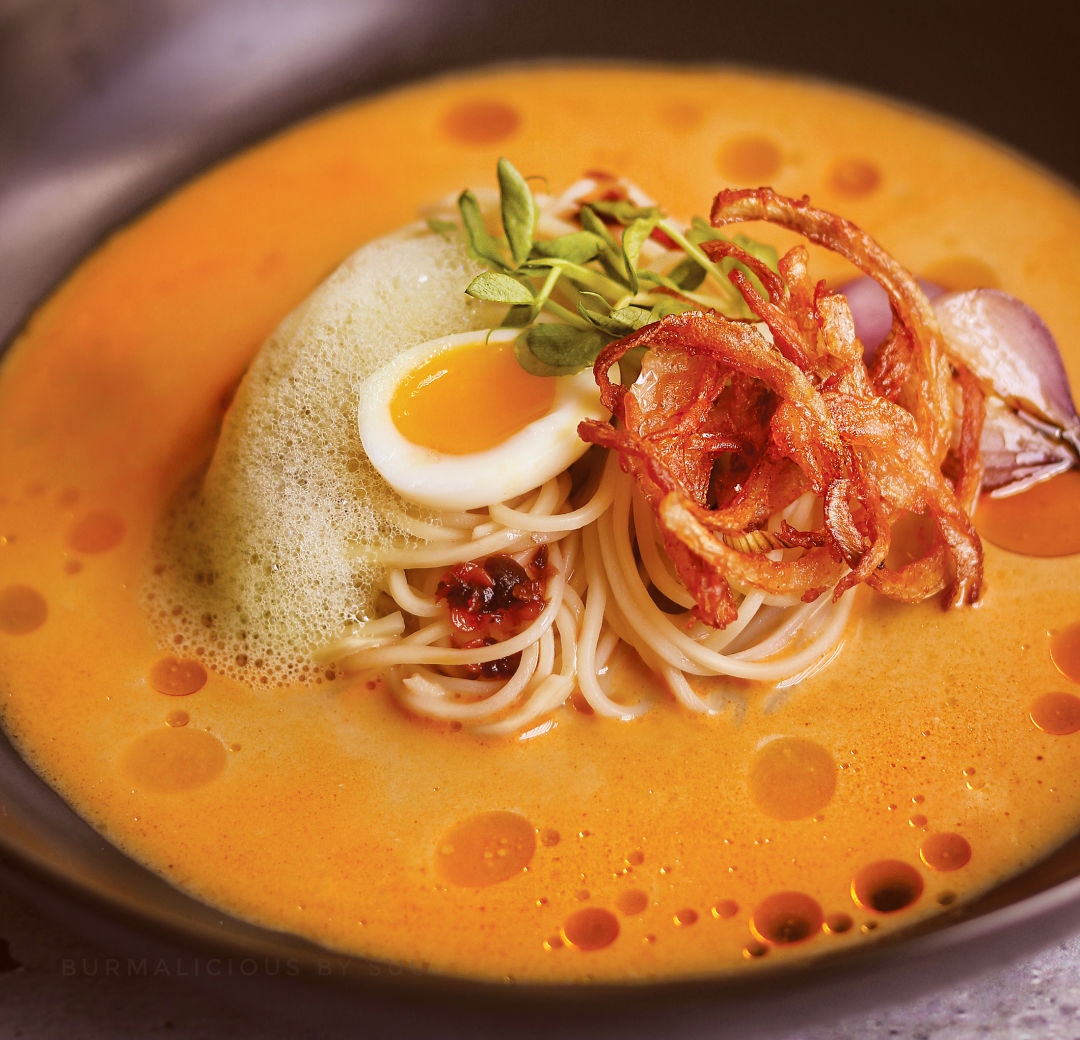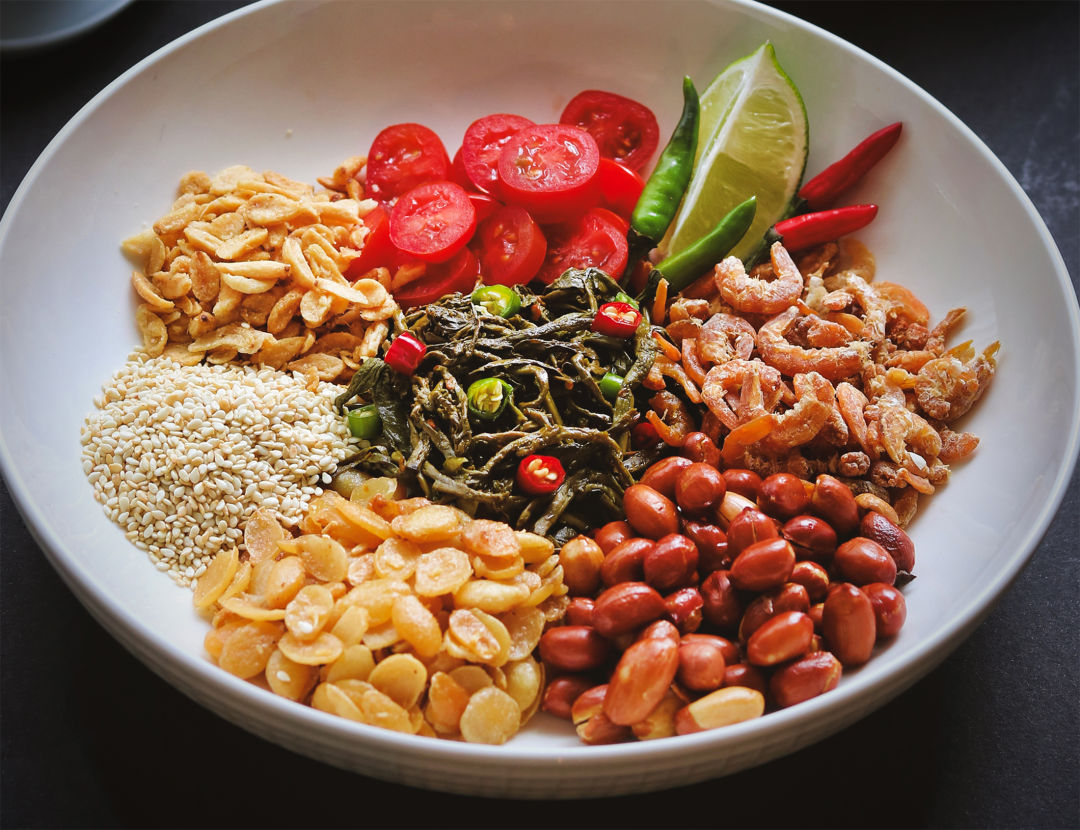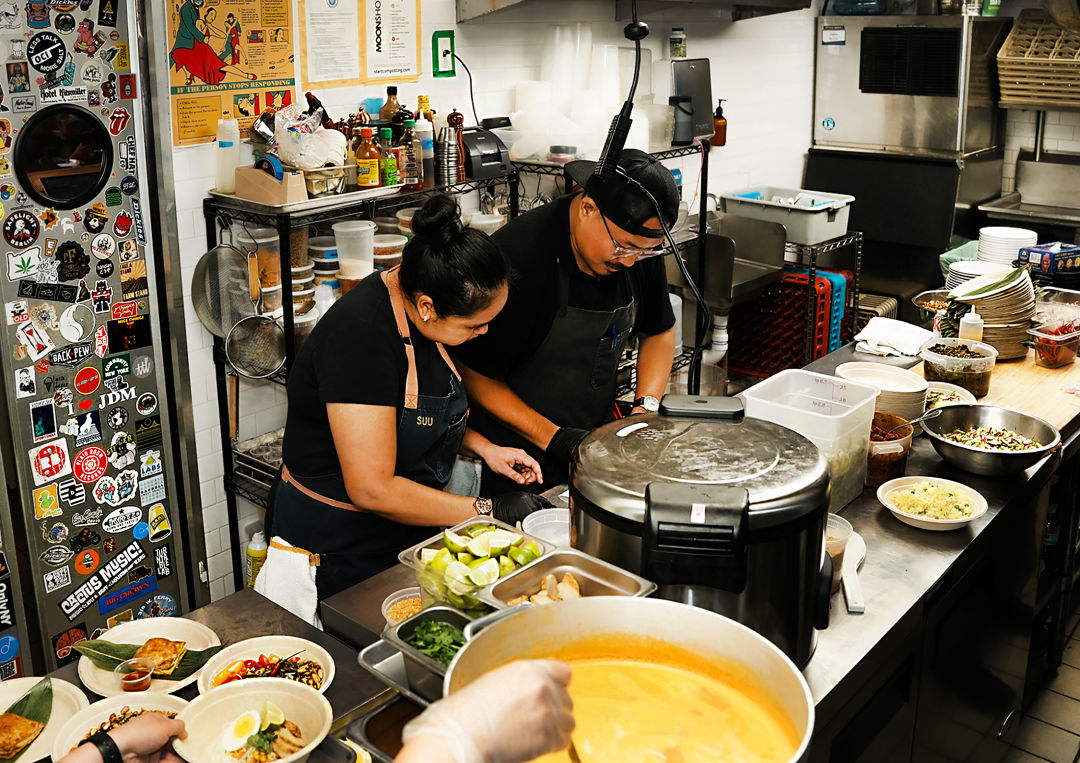Suu Khin Brings the World of Burmese Food to Houston

Image: Courtesy of Daniel Ortiz
Suu Khin grew up in her grandmother’s kitchen and garden. It was her responsibility every morning to fetch and collect all the fresh herbs and vegetables needed for the day. When she came back inside, she assumed the task of washing and chopping.
“I was my mom and grandmother’s personal food processor,” Khin says. “I’d pound everything in a mortar and pestle.”
In Burma, also known officially as Myanmar, this was a social norm. At the time, Khin knew she was expected to become a good cook in the kitchen so she could serve men properly, but that didn’t sit right with her. The thought of cooking filled her with aversion rather than affection.
That all changed when she moved to the US for grad school. At 23, Khin packed up her things and made the trek to Massachusetts. Because of the cold weather, she was often cooped up inside, which gave her waves of homesickness.
This led her to turn to food again. She began to find comfort in her dorm’s small kitchen, whipping up simple dishes like chicken in a potato curry. Slowly but surely, what used to feel like a dreadful chore turned into a prideful, joyful choice for Khin. During the three years she spent in Massachusetts—two spent getting her Master of Business Administration and one year of work—she began to host parties, cooking for others, and sharing her culture. It’s actually how she met her now-husband.
She decided to move back home to Burma to work at her dad’s law firm, but life had other plans for her. Instead of going back to her parents’ house, she settled in with her grandma, who was 95 years old at the time. During each cooking session, her grandma taught her new tips and tricks, while also sharing stories from her childhood that correlated to the ingredients being used.
“She would always have these incredible compelling stories. I started seeing food in a whole different, positive light, not just as a plate of food,” Khin says.
Given her grandma’s old age, it soon hit Khin hard that she wouldn’t have her beloved family member around forever, and she wanted nothing more than for these stories and memories to live on. So, Khin started to put it all in writing. In 2015, she came up with her Instagram handle, Burmalicious.
“That was just merely to preserve my grandmother’s recipes, and the stories associated with it,” Khin says.
After four years of living with her grandma, Khin got married and moved back to America in 2018. She jokes that her husband did an incredible job at hyping up Houston as a diverse food city, and thankfully, he was right. But she noticed one thing was missing: Burmese food.
She wanted to close that gap and put Burmese food on the map in Houston. She slowly transitioned her Burmalicious Instagram account from a preservation space to a medium where she could promote and demystify Burmese cuisine for a Houston audience. During the Super Bowl, for example, Khin would post a dish that maybe she, as a Burmese cook, would bring to a watch party.

Image: Courtesy of Suu Khin
Her account drew attention from the casting department of Master Chef. Khin notes that to audition for the show, there are three requirements: The individual must be 18, have no professional kitchen experience, and be either a US resident or citizen. At the time, Khin had only been back in America for a year, and was still working on getting her green card.
Khin relayed this to the casting department, but was told she had time to figure things out before the team traveled to Houston for the open casting call. Miraculously, two weeks before the audition, Khin’s green card came in the mail. The show was filmed in 2020, but because of COVID-19, it didn’t air until the summer of 2021.
Khin made it all the way to the finale as a runner-up, gaining confidence in her cooking while creating a platform for Burmese cuisine. Her Instagram’s following exploded overnight. This proved to her that people were ready to accept her culture’s food.
After the season aired, Khin went on a tour with Master Chef to 35 cities, where she got to cook in front of hundreds of people. But when she came back to Houston in early 2022, she felt lost and began to suffer from imposter syndrome. With more than 100,000 followers under her belt, she began to ask herself, “Do I become an influencer? Should I go back to culinary school? Or should I just open a Burmese restaurant?”
Her answer came when she judged the Gold Buckle Foodie Awards at the Houston Livestock Show and Rodeo in February 2022. She was at a table with well-known Houston chefs like Aaron Bludorn and Evelyn Garcia. They kept addressing her as “chef” and asking her about next steps, which got her wheels turning. The sense of community and the kindness she was showed made her realize that she wanted nothing more than to feel as if she earned the title of chef.
“I told myself, forget about being an influencer [or] a content creator, I’m not going to be anything, but just be a chef,” she says.
So she got to work. In July 2022, she hosted her first pop-up tasting menu dinner at Tenfold Coffee. It came with a fair share of challenges. For starters, the coffee shop has no kitchen, so chefs who host pop-ups there have to build their own makeshift kitchen in the parking lot.
Khin still pushed through and did her best to connect with the community. Khin made it a point to memorize every attendee’s name and give them the full story about each dish and its connection to Burmese culture.

Image: Courtesy of Suu Khin
Khin slowly realized the tasting menu was limiting, because there was no room to accommodate different dietary restrictions. So, last summer, Khin got to work on an à la carte menu. She showcases classic Burmese food through offerings like laphet, a pickled tea-leaf salad; ohn-no khao-swè, a chicken and coconut noodle soup; and mohinga, a lemongrass and catfish stew with noodles.
She also sometimes nods to Houston’s food scene, incorporating other cultural influences in her dishes. Her duck puff, for example, takes inspiration from the city’s large Vietnamese population by using duck liver pâté, paired with caramelized onions and mango sriracha.
Since beginning the à la carte menu, Khin has held pop-ups at several Houston restaurants and farmers markets including Urban Harvest, 93' Til, Anonymous Café, and Cucharita, and has also collaborated with several local chefs.

Image: Courtesy of Michael Ma
Khin’s hard work to preserve her culture through food is paying off: In January, she was named a 2025 James Beard Award semifinalist for Emerging Chef, a category that recognizes up-and-coming culinary professionals. How she discovered this is a funny story.
Khin didn’t expect to be on the semifinalist list. She was only scrolling through it to see which friends of hers made it, so when she saw her name, she was in shock. She went upstairs to knock on her husband’s home office, but he was in a meeting and didn’t answer. With all the emotions she felt, the only thing she could do was cry hysterically, which distracted her husband from his call—his first thought was, “Who died?” Once she relayed the James Beard news, it was all excitement from there.
The recognition also piqued the interest of many Houstonians. Khin had a pop-up planned for that Friday at Cucharita, and after the semifinalist list came out, she had to completely change her plans from feeding 60 guests to 300.
Embracing the momentum, Khin is now shopping around for a brick-and-mortar. She wants a place that can double as a quick counter-service spot for lunch and a tasting menu destination for dinner. And although her grandma isn’t around to see her success today, Khin knows she’s making her proud.
“I am carrying on her legacy,” Khin says. “Everything that I create—it’s always a conversation with my grandmother in my head.”




